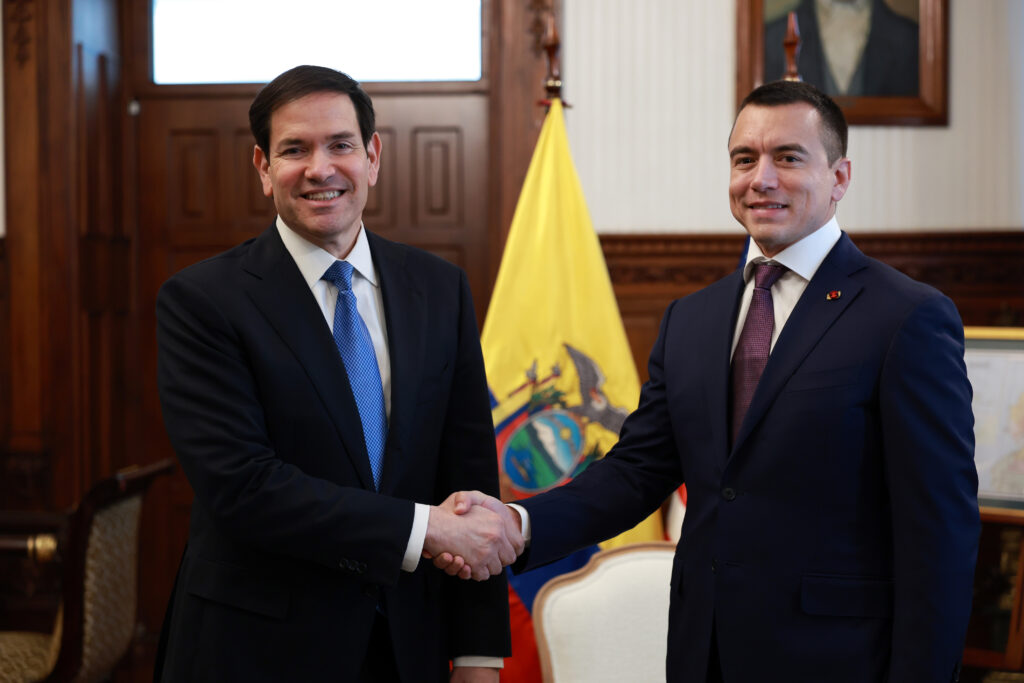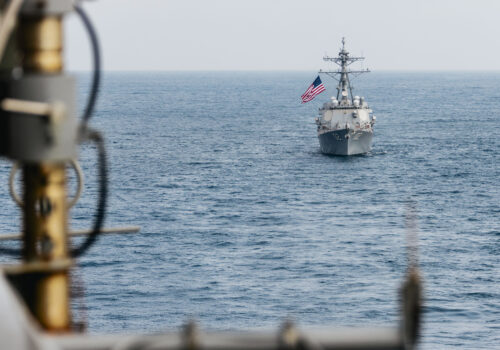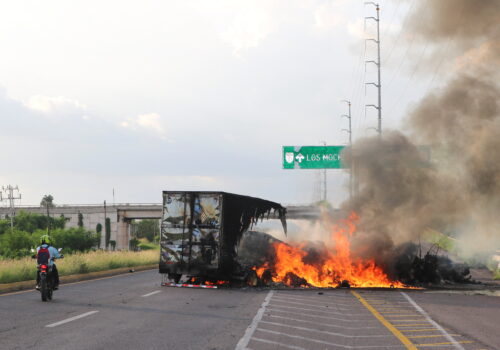This week, US Secretary of State Marco Rubio wrapped up a much-anticipated visit to Mexico and Ecuador, where security was the centerpiece. The trip was bookended by two dramatic events not far away: It began hours after the US military blew up a vessel in international waters in the Caribbean on Tuesday, and it ended at about the same time Venezuelan jets buzzed US Navy ships on Thursday night.
As the drama swirled, Rubio’s visit was an opportunity to consolidate long-term trust, cooperation, and collaboration with the United States’ partners in Mexico City and Quito. This and earlier trips to the region by the US secretary of state are part of a larger effort by Trump administration, which seeks to tie shared security together with enhanced prosperity for the Western Hemisphere. While progress is being made, the months and years to come will reveal whether this approach can overcome the region’s entrenched challenges.
A new implementation group in Mexico
In Mexico, President Claudia Sheinbaum and her cabinet welcomed deeper security cooperation with the United States while her secretary for foreign affairs, Juan Ramón de la Fuente, emphasized Mexican sovereignty and respect for territorial integrity during the joint press conference. Mexican officials stated clearly that each country must act against targets within their own borders. This emphasis on sovereignty should be seen in part as an attempt to shut down speculation by some that the United States might take unilateral action, including strikes against US-listed foreign terrorist organizations or other groups in Mexico.
Perhaps the biggest, most tangible announcement that came out of Palacio Nacional was the creation of a high-level implementation group to follow up on security commitments between the United States and Mexico. These commitments include coordinating joint operations against drug, arms, and human trafficking; overseeing efforts to dismantle cross-border tunnels and illicit financial networks; and designing rapid-response protocols for emerging threats. The new group is designed to give structure and permanence to bilateral security cooperation, and it will bring together senior US and Mexican officials from security, foreign affairs, and intelligence agencies. With the ability to spin off specialized subcommittees on issues such as fentanyl, firearms, and border infrastructure, the group will in effect act as a secretariat for security cooperation, with clear accountability built in through periodic progress reports to both governments. This marks an important step forward for cooperation between the United States and Mexico.
New security funding for Ecuador
Ecuador was once touted as one of the safest countries the region, but violence has increased in recent years. With five thousand murders this year as of July, the country’s homicide rate has increased by 40 percent in 2025 compared to the previous year. Much of this violence stems from criminal organizations and cartels. Reflecting this, the United States on Thursday designated Los Choneros and Los Lobos as foreign terrorist organizations and specially designated global terrorists.
While US-Ecuador cooperation is not new, the rise in violence, despite President Daniel Noboa’s efforts to tackle crime, underscores the urgency of providing increased US muscle to back his administration’s mano dura, or firm hand, policies. During his visit, Rubio announced nearly twenty million dollars in support for Ecuador, including six million dollars for naval drones. Rubio also mentioned the possibility of US troops on Ecuadorian soil, and, with an invitation from the Ecuadorians, potentially reopening a US base that was closed in 2009 under former President Rafael Correa.
The geopolitical significance of these announcements should not go unnoticed. These positive developments represent a major shift for US relations with Ecuador, a strategic ally that was once estranged and now in many ways sees eye-to-eye with the Trump administration, despite how heavily indebted it is to China. This stands in sharp contrast to US relations with long-time allies in the region, such as Colombia, whose ties with Washington have recently become more strained.
Also during the visit, US and Ecuadorian officials sketched the outlines of a potential migrant deportation agreement, though the details are pending. Last but not least, Rubio mentioned progress toward a bilateral trade deal.
From security cooperation to economic prosperity
Rubio’s focus both on enhancing security cooperation and on deepening economic ties is important, and his trip points the way toward a broader strategic vision for the region.
The Atlantic Council’s February 2024 Redefining US Strategy with Latin America and the Caribbean for a New Era report argues that the future of US engagement with the region must center on mutual, inclusive growth rooted in secure ties rather than transactional outreach. Specifically, the report envisions a revamped partnership built on shared values and country-specific strategies.
In effect, Rubio’s trip is a step toward turning that blueprint into a reality. The US secretary of state’s visit presented security cooperation as the entry point, but prosperity as the true test of success. Security cooperation should be conceived as a means to an end—in Latin America, that end should be economic security.
As Rubio said in Ecuador: “You cannot have economic prosperity without stability, and you cannot have stability without security. For example, it’s nearly impossible to attract foreign investment into a country unless you have security.”
With so much discussion surrounding the US counternarcotics operations in the Caribbean, it’s worth remembering that those shows of force are only one piece of the puzzle, and they should not distract from broader US efforts to build trust and enhance security cooperation in the region.
María Fernanda Bozmoski is director, impact and operations, and lead for Central America at the Atlantic Council’s Adrienne Arsht Latin America Center.
Further reading
Fri, Aug 29, 2025
Why are US warships heading toward Venezuela?
New Atlanticist By
Three Aegis guided-missile destroyers and several other US warships are headed to the waters near Venezuela. Two Atlantic Council experts explain why and what to expect next.
Wed, Jul 23, 2025
A terrorist designation should only be the start in weakening Mexican cartels
New Atlanticist By
The Trump administration’s designation of several Mexican drug cartels as foreign terrorist organizations must be followed by actions that meaningfully weaken those groups.
Mon, Apr 14, 2025
What Noboa’s reelection means for US-Ecuador ties
New Atlanticist By Isabel Chiriboga
Ecuador desperately needs international cooperation with partners such as the United States to curb the country’s crime wave and spur economic growth.
Image: US Secretary of State Marco Rubio (left) met with Ecuadorian President Daniel Noboa (right) in Quito, Ecuador, on September 4, 2025. Photo by Isaac Castillo. Latin America News Agency via Reuters Connect.



